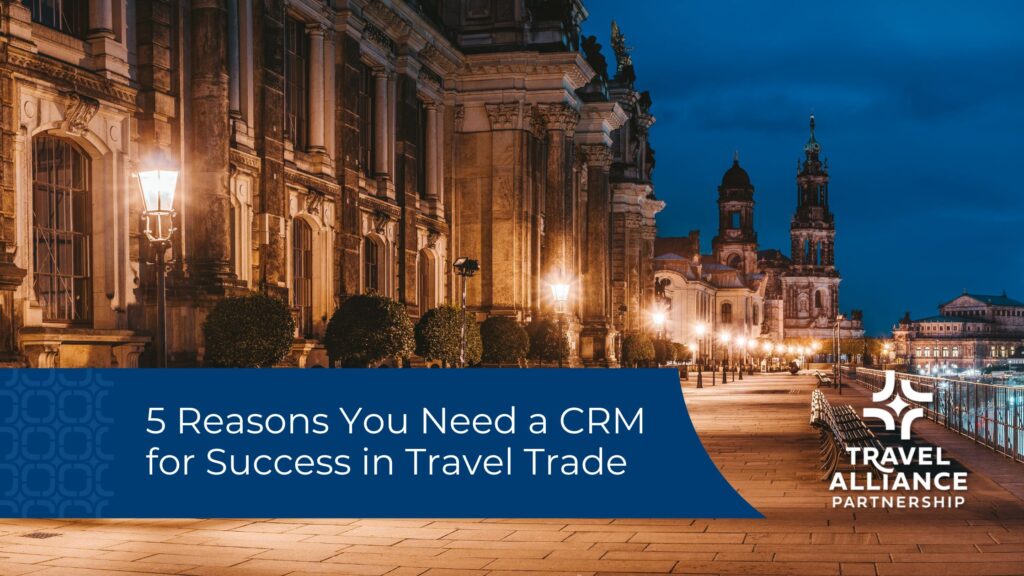5 Reasons You Need a CRM for Success in Travel Trade
Understanding CRM: What it is and Why it Matters
In the travel trade industry, success depends on effectively managing relationships with clients, suppliers, and partners. Yet, many businesses find themselves juggling scattered data, which can lead to missed opportunities and inconsistent follow-ups. A Customer Relationship Management (CRM) system is designed to bring all this essential information into one accessible place. With a tailored CRM, you can centralize client details, automate reminders, and provide the personal touch that builds loyalty and trust. By streamlining communication, marketing, and sales processes, a CRM allows travel businesses to deliver outstanding service and stay ahead of the competition. Here’s why having a great CRM is a game-changer for growth in travel trade.

1. Organized Data for Stronger Relationships
To get the most out of your CRM, focus on the details you input. A CRM consolidates all client information—such as contact details, preferences, trip history, and communication logs—into one easy-to-access location. This tool not only helps you stay in touch with community stakeholders like hotels, restaurants, and attractions but also strengthens your relationships with tour operators and travel agents.
By consistently adding information and tracking communications, your CRM will allow you to create more touchpoints for building stronger relationships. This means you can quickly retrieve important information and clearly see where your interactions with clients and stakeholders left off.
2. Streamlined Communication and Collaboration
Streamlined communication is essential for effective teamwork, especially when managing relationships. When everyone on your team can easily access the history of past interactions in your CRM, it ensures smooth collaboration.
For example, if a colleague sees that you sent a message to a tour operator just a week ago, they can tailor their follow-up conversation based on that context, potentially discussing specific tour packages that align with the group’s interests. This not only enhances the client experience but also fosters teamwork by keeping everyone informed.
3. Enhanced Sales and Lead Management
By organizing potential clients in one place, a CRM allows you to see where each lead stands in the sales process. For instance, you can easily identify which leads are interested in a cultural experience package but haven’t booked yet and follow up with custom messages to encourage them to visit your destination.
You can also analyze past interactions and operator preferences to create bookable products, such as adventure tours for thrill-seekers or cultural experiences for history buffs. This not only helps grow your destination efficiently, but also enhances the overall experience by ensuring you reach out at the right time with the right message.
4. Improved Retention and Loyalty
Let’s face it: we all prefer to work with people who understand us and our needs. We also appreciate those who are easy to communicate with and remember the important details. If a travel advisor knows you remember their clients’ preferences, they are more likely to book through you again. By effectively organizing client information in your CRM and using the data you input, you can enhance retention and loyalty among tour operators and travel agents. This personalized approach helps build stronger relationships, making it easier to work together and promote your destination.
5. Efficient Reporting for Data-Driven Decisions
CRM systems offer powerful analytics when you input the right information. Their reporting tools help you better understand your organization and its needs. After attending a tradeshow, you can use your CRM to track the leads you gathered, see who has been responsive, and calculate the return on investment (ROI) from your participation. By having access to these insights, you can make informed, data-driven decisions about your sales strategies and marketing efforts, allowing you to work more efficiently and effectively.
Choosing a CRM
Wondering where to start? Choose a CRM that aligns with your travel trade goals. Popular systems include Capsule, Keap, Salesforce, and HubSpot. There are many, so it helps to do your research to find out what will work best for you. Ask your peers what they use and the pros and cons of using that CRM system. Find out who your partners use and see if there are efficiencies you might get from using the same system. By implementing the right CRM, you can streamline operations, strengthen relationships, and ultimately boost bookings, setting your destination up for success in a competitive travel market.
Author
Related Posts
Marketing for Group Travel: Building Solid Relationships with Tour Operators
Group travel is a significant segment of the tourism market, and if you want to see those buses pulling up to the curb and filling…
Mastering the Sales Funnel: Essential Strategies for 2024
Unlocking Success Through Effective Prospecting, Cultivating Relationships, Strategic Positioning, and Confident Closing Every profession involves an element of sales, whether you’re pitching ideas, promoting a…
